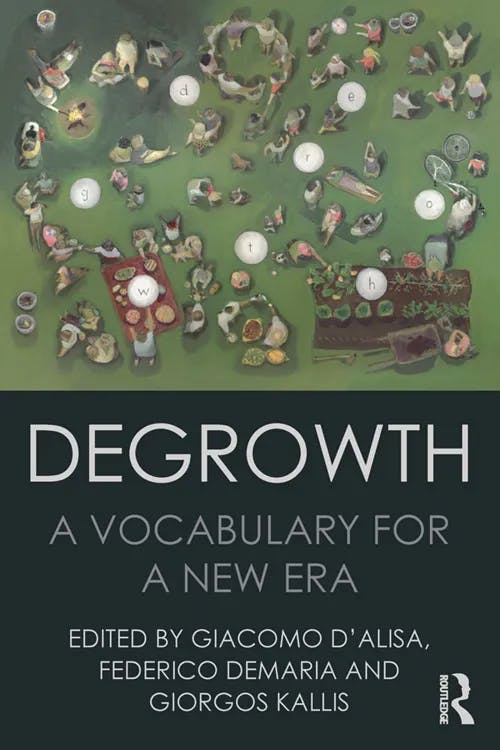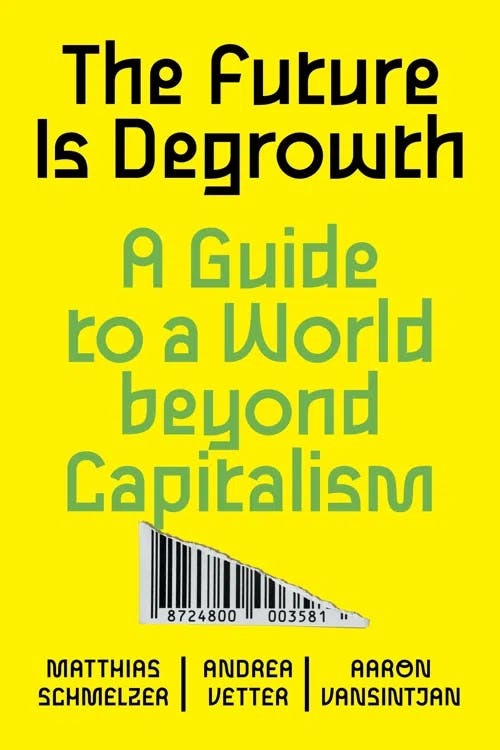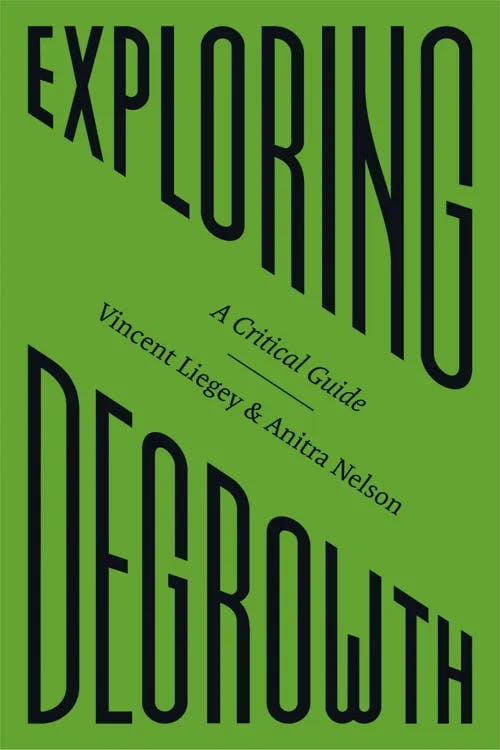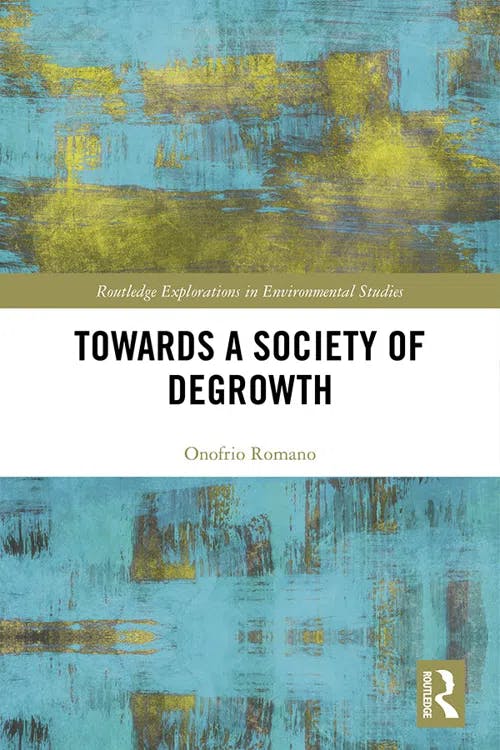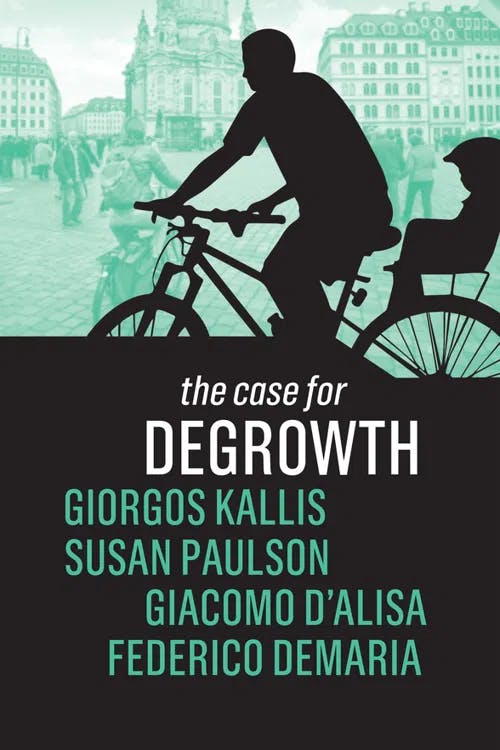What is Degrowth?
MA, Sociology (Freie Universität Berlin)
Date Published: 06.12.2023,
Last Updated: 21.02.2024
Share this article
Defining degrowth
Degrowth is an academic and social movement which challenges the idea that economic growth is the most important factor in a healthy economy. Rather than the pursuit of profit at all costs, proponents of degrowth argue that economies should be oriented around meeting human needs and in accordance with the finitude of the world’s natural resource base. The term was introduced in 1972 by French social philosopher André Gorz in his book, Capitalism, Socialism, Ecology. In this text, he called into question the ecological limits of our growth-oriented capitalist economic system. As Giorgos Kallis, Federico Demaria and Giacomo D’Alisa explain in Degrowth: A Vocabulary for a New Era,
Gorz posed a question that remains at the centre of today’s degrowth debate: ‘Is the earth’s balance, for which no-growth – or even degrowth - of material production is a necessary condition, compatible with the survival of the capitalist system?’ (2014)
Edited by Giacomo D'Alisa, Federico Demaria, and Giorgos Kallis
Gorz posed a question that remains at the centre of today’s degrowth debate: ‘Is the earth’s balance, for which no-growth – or even degrowth - of material production is a necessary condition, compatible with the survival of the capitalist system?’ (2014)
The concept then gained traction — and critical reception — shortly thereafter with the publication of the report, Limits to Growth (1972), by the Club of Rome. The paper is based on an MIT study that argued our economic system would bring about ecological collapse in the coming years.
Today, degrowth has gained more prominence as it has been developed by a range of thinkers including Serge Latouche, Nicholas Georgescu-Roegen, Giorgos Kallis, and Matthias Schmelzer, as well as climate activists like Greta Thunberg. There are also a number of organizations and think tanks dedicated to advancing the concept such as Research & Degrowth. While it is a broad and multifaceted movement, there are some core tenets. These include a critique of GDP-oriented economies, anti-consumerism, emphasis on ecological sustainability, and centering of social metrics as indicators of a well-functioning economy.
In this study guide, we will cover all of these in more depth. In addition, we will explore the main criticisms of degrowth, and global perspectives on the topic, concluding with some reflections on the future outlook of the movement.
Tenets and principles of degrowth
Critique of growth
The starting point of the degrowth movement is to challenge the notion that continuous unbridled growth ought to be the primary goal of economic activity. Advocates of degrowth — such as Matthias Schmelzer, Andrea Vetter, and Aaron Vansintjan — take issue with this for a couple of main reasons. The first is that the Earth’s natural resource base is finite, and prioritizing growth above all else will be detrimental to all life on the planet. As argued in The Future is Degrowth,
We have been told that the rising tide of growth will lift all ships if we do not rock the boat (meaning if we do not disturb the progressive unfolding of the forces of growth and accumulation). However, in the face of the ecological crises of ‘existential’ proportions, the opposite seems more accurate: If we do not rock the boat of growth and pull the emergency lever, all lower decks will soon drown. If we do not switch tracks now, we will continue to be rocked by crisis after crisis until growth itself throws society from its own rails – violently. (Schmelzer, Vetter, and Vansintjan, 2022)
Matthias Schmelzer, Andrea Vetter, and Aaron Vansintjan
We have been told that the rising tide of growth will lift all ships if we do not rock the boat (meaning if we do not disturb the progressive unfolding of the forces of growth and accumulation). However, in the face of the ecological crises of ‘existential’ proportions, the opposite seems more accurate: If we do not rock the boat of growth and pull the emergency lever, all lower decks will soon drown. If we do not switch tracks now, we will continue to be rocked by crisis after crisis until growth itself throws society from its own rails – violently. (Schmelzer, Vetter, and Vansintjan, 2022)
So, instead of adhering to free market capitalism, proponents of degrowth believe that the economy should be subject to conscious planning and interventions that help to ensure higher levels of equality and ecological sustainability.
The second reason for critiquing growth-oriented economies is that GDP tells us little about the well-being of society. For instance, the GDP in the United States has grown exponentially over the last 50 years, but the wealth is increasingly concentrated in the hands of a few as inequality has also grown.
With all this in mind, transitioning to a degrowth economy wouldn’t mean simply halting growth across all sectors at once. Rather, it’d start with more conscious economic planning to identify where we as a society ought to invest our labor and resources. For instance, on a state level, spending could be cut in subsidizing automobile and defense industries and instead invested in social goods like housing and public transportation, as well as in renewable energy. A degrowth economy might also involve implementing shorter working hours and providing Universal Basic Income. This would help to facilitate degrowth because people would not need to orient their lives around growth-oriented labor in order to receive the wages they need to live.
(For more perspectives on economic growth, read our study guide on New Growth Theory.)
Social metrics
Degrowth operates under the assertion that developed economies already have the productive powers to afford everyone a comfortable quality of life, and identifies that inequality has more to do with how goods are distributed under a model that prioritizes growth at all costs. Instead of using GDP as the main indicator of a functioning economy, degrowth rests on the assertion that a well-functioning economy ought to be measured by how well it meets people’s needs and maintains good living standards.
As Vincent Liegey and Anitra Nelson point out in Exploring Degrowth, this shift already coincides with — and more accurately reflects — a growing public consensus around what people want out of their work and their lives:
More and more surveys show rising expectations for quality of life rather than quantitative growth, and calls for more reuse, less work, more sharing and more recycling. (2020)
Vincent Liegey and Anitra Nelson
More and more surveys show rising expectations for quality of life rather than quantitative growth, and calls for more reuse, less work, more sharing and more recycling. (2020)
Thus, rather than placing emphasis on growth as the central factor defining a healthy economy, proponents of degrowth suggest we ought to shift to more holistic indicators that center on well-being and human development, rather than profit. The specific social metrics put forth under the degrowth paradigm include life expectancy, population health, levels of education, housing accessibility and affordability, and adoption of renewable energy. This approach also places more value on leisure time, strong communities and more comprehensive access to public services.
Anti-consumerism
You have likely heard of lifestyle trends like minimalism, slow living, and zero waste. These also speak to the desire that already exists among many to change the way we relate to consumption. Yet, these approaches are still taken as individual choices that are often only accessible to people who have the spending power to invest in higher quality and reusable products that are meant to last. Degrowth takes these trends a step further by arguing that we must change our relationship to consumption at structural and cultural levels to be truly effective in reducing our collective ecological footprint.
Proponents of degrowth — such as Onofrio Romano and Kate Soper — also maintain that cutting back on consumption isn’t about sacrificing a good quality of life. In fact, they argue the opposite: that our consumerist society sells us the illusion of love, belonging, and self-actualization through commodity consumption that ultimately leaves us alienated from one another and inundated with excess clutter in our lives. As Romano asserts in Towards a Society of Degrowth,
The aim is not to set up a society based on deprivation and scarcity, in order to preserve the systemic balance of the planet as much as possible. Instead, the idea is to recover, thanks to a moderation in the material dimension, a more convivial, human-friendly way of life. (2019)
Onofrio Romano
The aim is not to set up a society based on deprivation and scarcity, in order to preserve the systemic balance of the planet as much as possible. Instead, the idea is to recover, thanks to a moderation in the material dimension, a more convivial, human-friendly way of life. (2019)
Thus, degrowth seeks to change how we understand what good living is. Rather than being based on how much “stuff” we have, an anti-consumerist lifestyle would be focused on having more leisure time, closer-knit communities, and owning fewer but higher-quality possessions that are made to last.
In practice, this might look like transitioning from mass consumerist economies of scale to a revitalization of localized, decentralized production of goods within our communities. It could also include implementing policy regulations to end planned obsolescence like requiring that electronics and appliances have warranties, promoting the production of spare parts to make goods reparable rather than replacing them, and shifting from a culture of owning goods to one of borrowing — such as via tool libraries or leasing. Of course, transitioning from a culture of consumerism is also far more ecologically sustainable and would result in less waste and a lower overall ecological footprint.
For more information on anti-consumerist movements and theories, please see our study guides on culture jamming and the culture industry.
Ecological sustainability
Naturally, a major hallmark of degrowth is the matter of ecological sustainability. The reason that its supporters call for an end to the primacy of economic growth at all costs is that it is simply incompatible with the limited nature of the planet’s natural resources. Therefore, if we intend to mitigate the effects of climate change in the coming years, proponents of degrowth argue that it will be necessary to make significant changes to our growth-oriented economic model. As Kallis et al. argue in The Case for Degrowth,
Growing economies require constant inputs of resources, and constantly transform land, water, and air shared with other species. Environmental scientists designate our era as “the great acceleration.” (2020)
Giorgos Kallis, Susan Paulson, Giacomo D'Alisa, and Federico Demaria
Growing economies require constant inputs of resources, and constantly transform land, water, and air shared with other species. Environmental scientists designate our era as “the great acceleration.” (2020)
By contrast, a degrowth economy oriented around environmental sustainability might include drawing from principles of circular economy, such as product leasing and recycling of waste materials for other uses, and designing with more emphasis on energy efficiency. It would also involve scaling down energy-intensive industries such as beef production and air travel. Instead, more wealth and resources would be invested in renewable energy such as solar power, wind, and hydroelectricity. To learn more about how human activity in the modern era has led to an acceleration of environmental degradation, read our study guide on the Anthropocene.
Interestingly, ecological sustainability under a degrowth economic model wouldn’t just end on these usual suspects. It would also involve changing how we work, as part of a growth-oriented economy involves endless — and excessive — production that is facilitated by the 40-hour work week doing jobs that don’t necessarily need to exist. Degrowth advocates also for a revitalization of the importance of care-oriented work — whether teaching, community work, or eldercare — as more ecologically sustainable professions that ought to be elevated and prioritized as professions under a degrowth economy. For more on this, check out our study guide on ecofeminism.
Degrowth around the world
Degrowth is focused on addressing the fact that wealthier countries in the global North currently produce and consume at an unsustainable level. These regions are especially advised to dramatically scale down their energy use and resource extraction. This would allow more space for lower-income countries to grow their economies and achieve a better standard of living until they are able to reach parity with middle-income nations. In The Case for Degrowth, Kallis et al. reflect:
Responsibilities and responses are complicated by extreme differences among countries in terms of benefits and burdens of growth, and by the substantial ecological debt owed by societies who have, in recent centuries, consumed disproportionate amounts of global resources and produced more than their fair share of emissions and waste. (2020)
Thus, degrowth must acknowledge the economic unevenness that exists between different countries and address the exploitative relations between the global North and the global South. (For more analysis on these dynamics, check out our guide on world-systems theory.)
Specifically, part of the degrowth project also aims at dismantling neo-colonial relations between the global South and the global North, where resources are endlessly and recklessly extracted from the former to satisfy the consumption habits of the latter. This lack of resource sovereignty, in turn, makes it nearly impossible for poorer countries to develop on their own terms and in a sustainable way. At the same time, there is much to be learned from cultures around the world on how degrowth societies could look. Kallis et al. continue,
Although the term itself first gained traction in Europe, degrowth draws on and engages with enduring and emerging traditions in South America (Buen Vivir), India (Swaraj), and South Africa (Ubuntu), to mention a few. In every corner of the world, individuals and groups have been resisting incursion of growth initiatives into their territories and lives, and struggling to sustain old and to forge new paths away from growth. (2020)
In many ways, it is people in the global South who have been at the forefront of bringing about the cultural and attitudinal shifts necessary for degrowth. The notion of Buen Vivir in Latin America (identified by Kallis et al.) offers a case in point. Championed by indigenous peoples of the Andes, Buen Vivir means “good living,” and is defined by seeing a good life as one that is lived in harmony with a broader ecology. It is also about living in a community with others and rejecting the assumption that we should structure our lives around the capitalist logic of endless production and consumption. It, therefore, challenges conventional development as equating to Western-style industrialization, and instead centers principles of sustainability, indigenous sovereignty, and the commons.
(For more on the social and political dimensions of ecological sustainability, check out our guide on political ecology.)
Critiques of degrowth
Free market critique
Naturally, those in favor of free markets take issue with degrowth, as they involve intentional policy interventions in what they believe ought to be a self-regulating sphere. Those who prefer liberal economies — including sustainability advocates like Nicholas Stern and Jorgen Randers — believe that markets are themselves the best, most efficient means for distributing goods, resources, and services. They question the feasibility and desirability of slowing production and see it as a hindrance to technological innovation, wealth creation, consumer choice, and resource allocation — all of which they argue are vital for both free, democratic society and for mobilizing the resources and innovations necessary to tackle climate change. This critique is often cited by advocates of “green growth”:
For green growth advocates, degrowth is not only impossible, it is also unnecessary, since economic growth and technological progress can enable us both to have more stuff and to reduce resource use and carbon emissions. [...] Expenditure on a large-scale energy transition may stimulate growth and create new jobs, so green growth advocates claim. (2018)
Giorgos Kallis
For green growth advocates, degrowth is not only impossible, it is also unnecessary, since economic growth and technological progress can enable us both to have more stuff and to reduce resource use and carbon emissions. [...] Expenditure on a large-scale energy transition may stimulate growth and create new jobs, so green growth advocates claim. (2018)
Moreover, for all of us who are raised in capitalist economies, the idea of “degrowth” carries a negative connotation, which makes it off-putting and even downright frightening to those accustomed to growth as the sign of a functioning economy. In other words, degrowth can also be understood as economic stagnation, which would not promote well-being but lead to a recession and necessitate draconian state interventions like austerity measures. Thus, it can be difficult to imagine how degrowth could be compatible with our current economic model, rather than simply produce problems — from high unemployment, business failure, and austerity — that we associate with economic downturns.
You can find out more about the field of green growth in Inclusive Green Growth (2012) and Green Growth That Works (2019).
Marxist critiques
In many ways, degrowth has a neo-Marxist flavor in that it challenges the central tenets of capitalist economies that are predicated on the continual accumulation of profit above all else. Yet, more orthodox Marxists and socialists — such as Salvatore Engel-Di Mauro — tend to criticize degrowth for not being explicit enough about changing the economic model and putting control of the means of production into the hands of the workers. As Salvatore Engel-Di Mauro (also known as "Saed") explains in "Introduction to the Degrowth Symposium" (2012), "capitalism comes first."
Kallis expands upon the meaning of Engel-Di Mauro's argument in Degrowth:
[...] accumulation is not just growth but appropriation and control that expands the ability to appropriate and control more – a process founded on the violent exclusion of the majority from the means of reproduction and production. Growth is the outcome of this process, not the logic that drives it. (2018)
Put simply, Marxists believe that capitalism itself is the root cause of the problems outlined by degrowth and it simply cannot be tinkered with or reformed. To them, degrowth obfuscates that fact by taking on a softer, more reformist character — when they believe we must do away with capitalism altogether.
Future outlook on degrowth
With the impending threat of climate change, there is growing urgency around making changes to how we produce and consume. It will take substantive efforts across policy, industry, and culture to make this happen. Degrowth offers an alternative paradigm for how we approach these arenas — without having to radically overhaul every sphere of life. Along with a critique of economic growth at all costs, degrowth centers ecological sustainability, social metrics, and alternatives to consumerism as key tenets of how we should measure a well-functioning economy.
Looking to the future, degrowth is a blueprint for transitioning away from our extractive and exploitative economic model that prioritizes profit-making at the expense of the environment and our quality of life. Its proponents argue that it provides the possibility for achieving a comfortable standard of living for everyone on the planet, whilst also promoting environmental sustainability. It provides a path forward that also promises more fulfilling relationships, more free time, and less dependence on consumerism as a form of self-actualization. In sum, degrowth serves as an emancipatory vision for recentering the values of society on building stronger communities, revitalizing nature, and cultivating a more egalitarian society on a global scale.
Further reading on Perlego
Degrowth in the Suburbs (2018) by Samuel Alexander and Brendan Gleeson
Towards a Political Economy of Degrowth (2019) by Ekaterina Chertkovskaya, Alexander Paulsson, and Stefania Barca
From Bioeconomics to Degrowth (2011) by Nicolas Georgescu-Roegen and Mauro Bonaiuti
Food for Degrowth (2020) by Anitra Nelson and Ferne Edwards
The Degrowth Alternative (2020) by Diana Stuart, Ryan Gunderson, and Brian Petersen
Degrowth FAQs
What is degrowth in simple terms?
What is degrowth in simple terms?
What is an example of degrowth?
What is an example of degrowth?
Who are scholars associated with degrowth?
Who are scholars associated with degrowth?
Bibliography
D'Alisa, G., Demaria, F., and Kallis, G. (eds.) (2014) Degrowth: A vocabulary for a new era. Routledge. Available at: https://www.perlego.com/book/1615120/degrowth-a-vocabulary-for-a-new-era-pdf
Gorz, A. (2014) Capitalism, Socialism, Ecology. Verso Books. Available at: https://www.perlego.com/book/731233/capitalism-socialism-ecology-pdf
Engel-Di Mauro, S. (“Saed”)(2012) “Introduction to the Degrowth Symposium,” Capitalism Nature Socialism (CNS), 23.1.
Kallis, G., Paulson, S., D'Alisa, G., and Demaria, F. (2020) The Case for Degrowth. Available at: https://www.perlego.com/book/1978780/the-case-for-degrowth-pdf
Kallis, G. (2018) Degrowth. Agenda Publishing. Available at: https://www.perlego.com/book/743334/degrowth-pdf
Liegey, V., and Nelson, A. (2020) Exploring Degrowth: a critical guide. Pluto Press. Available at: https://www.perlego.com/book/1706972/exploring-degrowth-a-critical-guide-pdf
Mandle, L., Ouyang, Z., Salzman, J.E., and Daily, G.C. (2019) Green Growth That Works. Island Press. Available at: https://www.perlego.com/book/3288223/green-growth-that-works-natural-capital-policy-and-finance-mechanisms-around-the-world-pdf
Meadows, D., Meadows, D., Randers, J., and Behrens, W.W. (1972) Limits to Growth. Potomac Associates.
Romano, O. (2019) Towards a Society of Degrowth. Routledge. Available at: https://www.perlego.com/book/1375958/towards-a-society-of-degrowth-pdf
Schmelzer, M., Vetter, A., and Vansintjan, A. (2022) The Future is Degrowth: a guide to a world beyond capitalism. Verso. Available at: https://www.perlego.com/book/3534800/the-future-is-degrowth-a-guide-to-a-world-beyond-capitalism-pdf
World Bank. Inclusive Green Growth. (2012) World Bank. Available at: https://www.perlego.com/book/1483838/inclusive-green-growth-the-pathway-to-sustainable-development-pdf
MA, Sociology (Freie Universität Berlin)
Lily Cichanowicz has a master's degree in Sociology from Freie Universität Berlin and a dual bachelor's degree from Cornell University in Sociology and International Development. Her research interests include political economy, labor, and social movements. Her master's thesis focused on the labor shortages in the food service industry following the Covid-19 pandemic.

